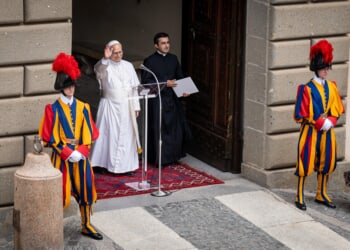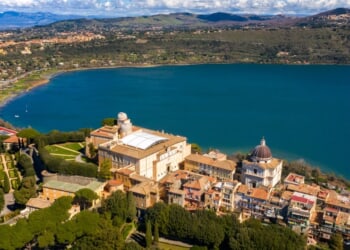Rafe Fletcher is the founder of CWG.
Singapore doesn’t dwell in colonial nostalgia. It looks back with clarity and pragmatism to explain the present. In contrast, the UK compresses its identity into a selective version of recent history, seeing empire as a scar and tolerance and diversity as all that defines us. More jingoism won’t cure Britain’s malaise – but honesty and objectivity will help.
Sir Stamford Raffles’ statue stands on the north side of the narrow Singapore river that separates parliament from the city state’s financial district, Raffles Place. An engraving marks it as the “historic site Sir Thomas Stamford Raffles first landed in Singapore on 28th January 1819”. It pays tribute to his “genius and perception” that “changed the destiny of Singapore from an obscure fishing village to a great seaport and modern metropolis.”
Kind words for the British colonialist may surprise Bob Vylan and its fans. Serenading Glastonbury with “I heard you want your country back”, the duo talked about men like Raffles as “ignorant scum tryna lay claim to a land that ain’t theirs anyway.” While the UK’s establishment doesn’t phrase it in such colourful terms, there is a consistent impulse to atone, rather than assert. To fixate on good global citizenry above national self-interest.
It’s evident in former Cabinet Secretary Gus O’Donnell’s position that his job was to “maximise global welfare not national welfare”; or the Home Office’s threat of legal action over being asked to enact the Rwanda plan; or ceding the Chagos Islands to Mauritius because of an advisory opinion from the UN’s International Court of Justice – a motion that was supported by such famous proponents of territorial integrity as Russia and China.
Where Singapore views that history with realism, British institutions moralise, assign arbitrary motives, and frame it as a source of collective guilt. The British Council’s New Narratives Report, commissioned in 2020 to “reimagine” the UK’s national identity in the wake of Black Lives Matter and Brexit, claims the abolition of slavery created a “narrative of the African as dependent on the English to provide them with liberty, ensuring that Africans remained passive, subservient, and eternally grateful.” (And that we wrongly imbibed a sense of virtue from this self-serving cause.)
Contrast that with Lee Kuan Yew Singapore’s founding prime minister, speaking to a Labour Party rally in Scarborough in 1967. He said Singapore was fortunate to inherit “an administration which worked, and an economy which we built upon to provide a standard of living in Asia second only to Japan.”
But he didn’t attribute this to great British benevolence. Rather, it was out of “enlightened self-interest” that the UK built these institutions. He saw a usable legacy where the British Council intuits only guilt and self-deception.
This doesn’t mean Singapore offers a perfect model. Its national identity can feel inorganic. As the country approaches its 60th anniversary on 9 August , flags line the streets and F-16 jets dominate the skyline, practising for the big day. But patriotism is top-down rather than spontaneous: Ethnic tensions exist; the majority Chinese population are often seen as privileged over Malay and Indian citizens.
Lee never shied away from this reality. He openly shaped immigration policy to preserve what he called a “racial balance.” Today, the government maintains a tight grip on speech to preserve social harmony (a retired doctor was recently fined $10,000 for “denigrating Islam” on Facebook). Away from the state-owned media, there is a more ambivalent picture. On a popular podcast, local comedian Fakkah Fuzz asked what really unites Singaporeans beyond a shared pursuit of money.
But Raffles nevertheless provides an anchor for Singapore’s national story. He is a starting point for Lee’s vision. By 1836, the Chinese outnumbered the original Malay population. But without an ideological narrative to bind various arrivals, Singapore had to build a shared identity from scratch after separating from Malaysia in 1965.
If Singapore sometimes struggles to forge a coherent story from a shallow past, the UK’s problem is the opposite. Four nations, with histories stretching back over a millennium – but instead of drawing on this history, we’re embarrassed by it and instead compress our identity into a narrative barely older than Singapore’s independence. We’re a much older country with a much shorter memory.
That’s evident in Sir Keir Starmer’s recent claim that the Windrush generation laid the “foundation for modern Britain”; a 2,000 year history defined by just 77 years.
Reflections upon a deeper past only happen through the moralising lens of institutions like the British Council. While Singapore looks back objectively, we take a handful of post-WW2 events and project backwards; we dodge difficult conversations about social cohesion or rapid demographic change by saying: “This is who we’ve always been – a diverse land of immigrants. Diversity is our strength.”
This false memory shapes Britain’s strategic inertia. How can we position ourselves in the world if we don’t even know who we are? Lacking confidence in any story, we retreat into the vague comfort of being a good global citizen, eschewing purpose for subservience within the international community. The UK can no longer be a force for good in itself, only in relation to others. Lee’s doctrine of “enlightened self-interest” is dismissed as embarrassingly anachronistic.
It’s why news of the Afghan resettlement and cover-up has become so politically charged. Amongst the incompetence, the just cause gets lost. These are people who risked their lives for Britain. We owe them safety because we screwed up.
But Nigel Farage can speculate that they’re a load of sex pests and breed further cynicism because it all just blends into a diversity-for-diversity’s-sake agenda: just let them in, we’re a land of immigrants anyway.
If we can’t frame anything within a historical narrative of the UK’s enlightened self-interest, then we’ll always look passive and credulous. Contrast that debacle with the BNO scheme for Hong Kongers. Yes, it helps that these are relatively prosperous newcomers. But it was accepted because it was a confident assertion of British history; we ruled Hong Kong and we have a responsibility for its people. Duty, not international law. History, not ideology.
It’s why the initial right-wing impulse to ban Bob Vylan misses the point. Their crude take on the British Empire at least raises its spectre – it’s a case we can answer. Opposition to their facile views shouldn’t, however, just be a louder rendition of Rule Britannia, but to open up a more nuanced discussion on history and what it means for us today.



![Former Bravo Star Charged After Violent Assault Using a Rock-Filled Sock in Tennessee Walmart [WATCH]](https://www.right2024.com/wp-content/uploads/2025/07/Former-Bravo-Star-Charged-After-Violent-Assault-Using-a-Rock-Filled-350x250.jpg)



![Illegal Alien Walked Free After Decapitating Woman, Abusing Corpse for Weeks [WATCH]](https://www.right2024.com/wp-content/uploads/2025/07/1753013138_Illegal-Alien-Walked-Free-After-Decapitating-Woman-Abusing-Corpse-for-350x250.jpg)
![NYC Man Snatches Child Off The Sidewalk, Parents Chase Him Down [WATCH]](https://www.right2024.com/wp-content/uploads/2025/07/NYC-Man-Snatches-Child-Off-The-Sidewalk-Parents-Chase-Him-350x250.jpg)
![Man Arrested After Screaming at Senators During Big Beautiful Bill Debate [WATCH]](https://www.right2024.com/wp-content/uploads/2025/06/Man-Arrested-After-Screaming-at-Senators-During-Big-Beautiful-Bill-350x250.jpg)
![Karoline Leavitt Levels CNN's Kaitlan Collins and Other Legacy Media Reporters [WATCH]](https://www.right2024.com/wp-content/uploads/2025/07/Karoline-Leavitt-Levels-CNNs-Kaitlan-Collins-and-Other-Legacy-Media-350x250.jpg)






